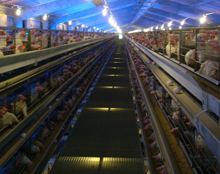US egg producers and HSUS agree on new rules for layer housing

United Egg Producers (UEP) and the Humane Society of the United States (HSUS) came to an agreement to work together toward the enactment of comprehensive new federal legislation for all 280 million hens involved in U.S. egg production.
The proposed standards advocated by UEP and HSUS, if enacted, would be the first federal law addressing the treatment of animals on farms.
The proposed legislation would:
• require conventional cages (currently used by more than 90 percent of the egg industry) to be replaced, through an ample phase-in period, with new, enriched housing systems that provide each hen nearly double the amount of space they’re currently allotted. Egg producers will invest an additional $4 billion over the next decade and a half to effect this industry-wide make-over;
• require that all egg-laying hens be provided, through the new enriched housing system, with environments that will allow hens to express natural behaviors, such as perches, nesting boxes, and scratching areas;
• mandate labeling on all egg cartons nationwide to inform consumers of the method used to produce the eggs, such as “eggs from caged hens,” “eggs from hens in enriched cages,” “eggs from cage-free hens,” and “eggs from free-range hens”;
• prohibit feed- or water-withholding molting to extend the laying cycle, a practice already prohibited by the United Egg Producers Certified programme adhered to by a majority of egg farmers;
• require standards approved by the American Veterinary Medical Association for euthanasia for egg laying hens;
• prohibit excessive ammonia levels in henhouses;
• prohibit the sale of eggs and egg products nationwide that don’t meet these requirements.
The two groups will jointly ask Congress for federal legislation which would require egg producers to increase space per bird in a tiered phase in, with the amount of space birds are given increasing, in intervals, over the next 15 to 18 years. Currently, the majority of birds are each provided 67 square inches of space, with roughly 50 million receiving 48 square inches. The proposed phase-in would culminate with hens nationwide being provided a minimum of 124 – 144 square inches of space, along with the other improvements noted.
“America’s egg producers have continually worked to improve animal welfare, and we strongly believe our commitment to a national standard for hen welfare is in the best interest of our animals, customers and consumers,” said Bob Krouse, chairman of UEP and an Indiana egg farmer. “We are committed to working together for the good of the hens in our care and believe a national standard is far superior than a patchwork of state laws and regulations that would be cumbersome for our customers and confusing to consumers.”
“Passing this bill would be an historic improvement for hundreds of millions of animals per year,” stated Wayne Pacelle, president and CEO of The Humane Society of the United States. “It is always our greatest hope to find common ground and to forge solutions, even with traditional adversaries. We are excited about a new and better pathway forward, and hope the Congress seizes the opportunity to embrace this sort of collaboration and mutual understanding. We extend our thanks to the producers within the industry for agreeing to make the needed investments to upgrade their housing and to improve animal welfare in a meaningful way.”
If passed by Congress, the legislation would supersede state laws including those that have been passed in Arizona, California, Michigan and Ohio. In recognition of ballot Proposition 2 passed by voters in that California in 2008, UEP and HSUS will ask Congress to require California egg producers – with nearly 20 million laying hens – to eliminate conventional cages by 2015 (the date Prop 2 is scheduled to go into effect), and provide all hens with the space and environmental enrichments that the rest of the egg industry will be phasing in over the next 15 to 18 years. These requirements will also apply to the sale of all eggs and egg products in California under the proposed federal legislation.
This agreement to pass comprehensive federal legislation for standards of egg production puts a hold on planned ballot measures related to egg-laying hens in both Washington and Oregon.
Related websites:
United Egg Producers
Humane Society of the United States












